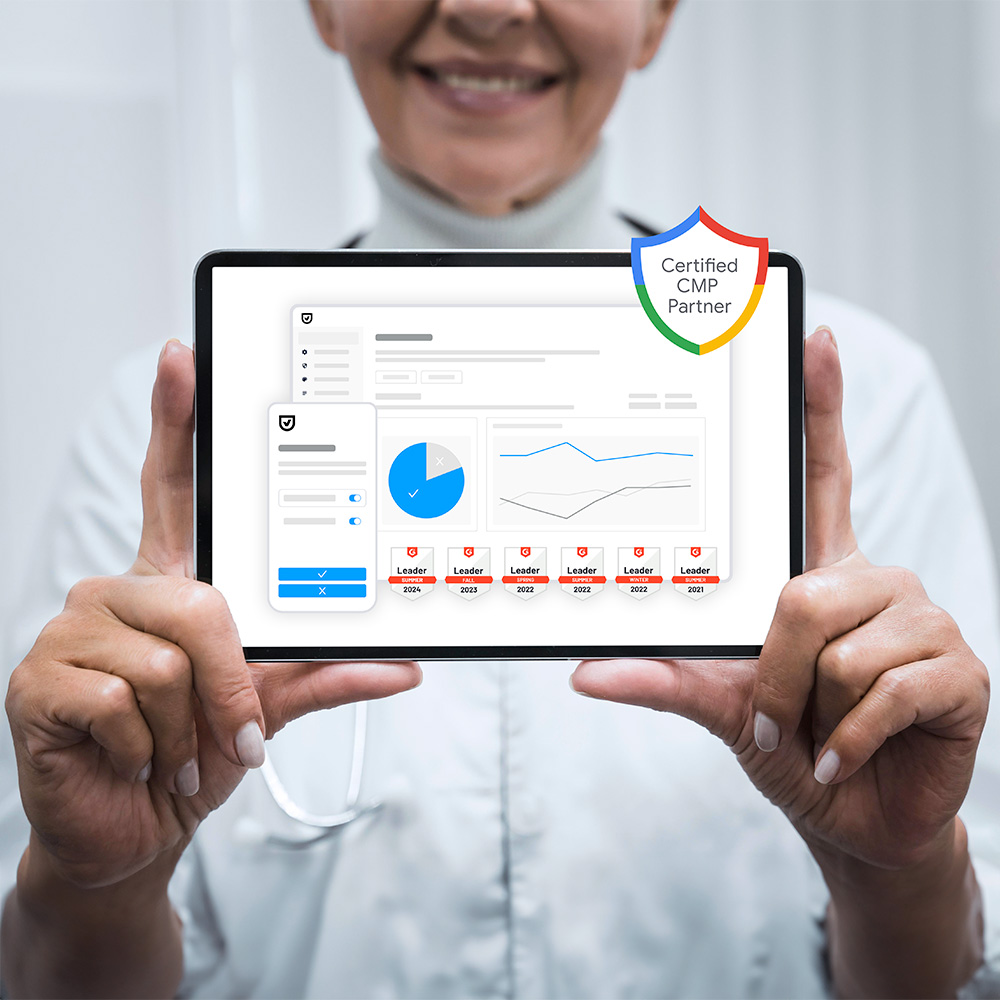The last couple of years have seen significant changes in digital advertising for publishers and developers. Starting in January 2024, those using Google AdSense, Ad Manager, or AdMob had to adopt a Google-certified consent management platform (CMP) if they want to keep serving ads in the EU, EEA, and UK.
The change was the result of new privacy standards introduced by the IAB Europe’s Transparency & Consent Framework (TCF) v2.2, which was designed to give users more clarity and control over their data.
The updates have meant restrictions in allowable legal bases for certain functions, along with new requirements for CMPs, and new rights for users. With these new obligations came opportunities for companies to build trust with users.
Google requires companies using its services, e.g. for advertising, to implement a Google-certified CMP. There is a public list of certified companies, and Google introduced a tiering system — Bronze, Silver, and Gold — to specify the degree to which core requirements, platform coverage, support, and other factors are met.
Usercentrics and Cookiebot CMPs have Gold Tier certification, and the company is a Google-certified CMP partner. The certification means that Google customers have the highest possible success rate for implementations of the CMP, consistently receive outstanding customer support, and can easily set it up with Consent Mode.
In addition to the Gold Tier certification, the Usercentrics CMPs are among a small number of direct integrations currently available within the Google user interface inside of Google Ads, Google Analytics, and Google Tag Manager to provide this straightforward and user-friendly functionality.
We combine compliance expertise, seamless integration with Google tools, and enable user-friendly consent experiences. Continue to meet privacy compliance requirements while protecting your revenue streams and strengthening your customer relationships.
2025 updates to Google’s CMP Partner program
For the 2025 CMP Partner Program re-certification, Google introduced three new requirements and tiering criteria:
- Third-party plugin support for WordPress and Shopify
- Diagnostic tool for Consent Mode
- App-ready partner recognition
Usercentrics Web and App CMPs have met these new requirements, continuing as a Gold Tier Partner. We are also now recognized as an app-ready partner.
Learn more about Google’s 2025 recertification requirements and new “app-ready” annotation and what they mean for customers.
What are the requirements of the TCF v2.2?
The TCF provides a standardized framework for managing and communicating user consent for data processing related to advertising in the EU, as part of compliance with regulations like the General Data Protection Regulation (GDPR), Digital Markets Act (DMA), UK GDPR, and Privacy and Electronic Communications Regulations (PECR).
The TCF v2.2 was launched in May 2023, and updates to Google’s requirements for advertisers came in response. The TCF’s changes were designed to improve transparency from advertisers and give users greater control over their consent choices.
The main changes were:
- Legitimate interest can no longer be selected as a legal basis for advertising and content personalization; instead, user consent is required.
- CMPs must replace purpose names and descriptions that are written in legal language with user-friendly text that’s easy to understand.
- The total number of vendors that a publisher uses must be shared on the first layer of the CMP.
- Users must be able to easily access the CMP at any time to manage or withdraw their previously given consent.
The TCF v2.3 is expected to enter into force on February 1, 2026, so more changes are likely on the way given the evolution of the tech and regulatory landscapes since 2023.
Learn more: Stay ahead of the curve with TCF v2.2: key upgrades and changes.
Benefits of the TCF v2.2 and Google-certified CMPs
There are three main areas of improvement that came with the launch of the TCF v2.2, which center around consistency, user rights, and protection for businesses. Google’s requirements bring these responsibilities and benefits to their customers.
Traffic managed by a Google-certified CMP partner like Usercentrics continues to be eligible for both personalized and non-personalized ads on Google systems.
Standardization of consent mechanisms
The TCF aims to standardize how consent is obtained, stored, and shared among digital advertising industry players. By requiring a certified CMP, Google is promoting a consistent and compliant approach to consent management across its advertising ecosystem, reducing the risk of regulatory violations and enhancing user trust.
User transparency and control
The TCF enhances transparency and control for users over how their data is used for advertising purposes. A Google-certified CMP provides users with clear information about data processing and the ability to give, decline, or customize their consent. This aligns with Google’s broader commitment to user privacy and control, per their EU user consent policy.
Risk mitigation
By aligning with TCF standards through a certified CMP, Google mitigates the risk of legal challenges and penalties associated with regulatory noncompliance. This is especially crucial given the substantial fines that can be levied due to GDPR violations.
How the Usercentrics CMP works with Google Consent Mode
Customers that have implemented the Usercentrics CMP collect granular and informed user consent for all the cookies and other tracking technologies in use on websites or apps.
Paired with Google Consent Mode, Google tags receive consent signals to determine if permission has been given for a site to use cookies for advertising purposes for a given user.
For additional guidance on setting up consent mode on websites and mobile apps, check the Google implementation guide.
Google tags adjust their behavior and only fire those cookies if consent has been granted for that specific purpose, and conversion reports reflect each case. Specific tag blocking isn’t required, because tags for which consent has not been received aren’t activated at all.
The Usercentrics CMP centralizes the function of your implemented Google services, enabling ongoing privacy compliance peace of mind.
What happens if a user declines consent?
If a user chooses not to consent to use of relevant cookies or other tracking technologies in use, Google Consent Mode provides aggregate and non-identifying information, with basic measurements and modeling data, like visit timestamps, user agent, referrer, etc.
Publishers: Get our full guide to understanding Google Additional Consent.
What Google services does Google Consent Mode support?
Google Consent Mode supports the following:
- Google Ads: Conversion tracking and remarketing tags adapt to consent and can use modeled conversions when eligible.
- Google Analytics 4: Measurement behavior adjusts based on consent signals (web and apps.)
- Google Tag Manager / Google tag (gtag.js): Built-in consent features (consent initialization, consent overview) and tag behavior that respects consent.
- Floodlight (Campaign Manager 360, Display and Video 360, Search Ads 360): Floodlight tags adapt to consent; SA360 also supports consent-mode modeling.
- Apps (Android/iOS) via SDKs: Consent Mode for apps with Google Analytics for Firebase and Google Mobile Ads/Ad Manager SDK; consent values are interpreted at runtime.
How to choose the best Google-certified CMP partner for your business
Selecting a CMP that is certified and meets Google consent management platform requirements is a crucial decision for businesses targeting users in the EU, EEA and the UK. Here are key considerations to guide this selection process.
Evaluate TCF compliance
Your consent management platform must be IAB-compliant and meet the requirements of the current version of the TCF — and the release of v2.3 is coming up quickly. Additionally, Google and other influential platform providers update their requirements regularly, and the global regulatory landscape is ever-changing.
You need a CMP that helps you easily meet new and changing requirements, with automation to reduce maintenance overhead.
Integration capabilities
You want a fast, smooth CMP implementation, with seamless integration into your tech stack and no hiccups as your compliance needs and business growth scale.
Your CMP needs to just work with the tools your business already uses. This includes Google products — Google AdSense, Ad Manager, or AdMob — as well as your website management system, e-commerce platform, and analytics tools. You need to protect your business while getting the critical data you need and being able to gain insights from it.
Customization and flexibility
You need a high level of customization to align user-facing elements like the banner with your branding and messaging, especially when applying localization principles. The CMP’s user interface and tools need to be as user-friendly as the consent banners to minimize the time and resource commitments for setup and changes, especially for future legal and tech requirements.
These features contribute to your privacy compliance peace of mind today and long-term operational resilience.
Support and documentation
You need a CMP partner that will be there with you from day one and every day as your company grows. You want clear, comprehensive, and easily accessible documentation for immediate help, and support people who are knowledgeable and responsive. Consider the following:
- Customer support availability: Friendly, reliable, and accessible customer support via multiple channels, like email, live chat, or ticketing systems.
- Regular software updates: Your CMP provider should provide regular software updates that not only address bugs or security vulnerabilities, but also enable continued compliance with the latest legal and platform standards.
- Dedicated account management: A dedicated account manager or support representative speeds up and enhances the quality of service with personalized support and understanding of the specific needs and history of your business.
- Documentation and resources: Comprehensive documentation, including user manuals, knowledge bases, FAQs, and how-to guides that are clear, up to date and easily accessible. Bonus points for multi-format information that benefits different learning styles, including video and infographics.
Why choose Usercentrics as your Google-certified CMP partner
Usercentrics CMPs not only fulfill only Google’s requirements for certified CMPs, but our platform and features help our customers to achieve and maintain global regulatory compliance as laws and frameworks change.
Continue your digital advertising campaigns with peace of mind and get the data you need for smarter decision-making, knowing you’re positioned for sustainable growth without undue pains.
Usercentrics CMP supports web platforms; mobile apps and games; and other connected platforms like TV. Our powerful features enable seamless cross-platform consent experiences for today’s digitally native consumers.
We help your business meet data privacy requirements in the EU around the world, including:
- State-level laws in the US
- US federal regulations for highly regulated industries like healthcare with the Health Insurance Portability and Accountability Act (HIPAA)
- Canada’s Personal Information Protection and Electronic Documents Act (PIPEDA)
- Switzerland’s Federal Act on Data Protection (FADP)
- Brazil’s Lei Geral de Proteção de Dados (LGPD)
- South Africa’s Protection of Personal Information Act (POPIA)
Geolocation functionality helps you present the right messaging and consent choices to the right audience — in their preferred language — at the right time, every time.
As a Google-certified CMP partner, Usercentrics integrates with multiple Google products, platforms, and APIs, like Google AdSense, Ad Manager and AdMob, as well as Google Tag Manager, Google Consent Mode, and Google Analytics 4 (GA4).
Usercentrics CMP integrations cover popular content management systems, including Adobe Experience Manager, Shopify, WordPress, BigCommerce and PrestaShop.
Learn more about WordPress cookie consent now.
Our extensive partner base includes implementation specialists, marketing agencies, and legal service providers that set up, maintain, optimize, and support the Usercentrics CMPs.





